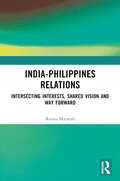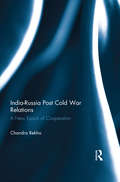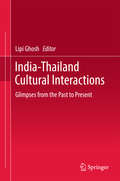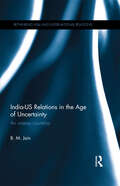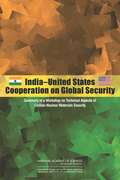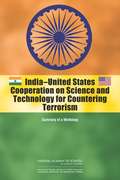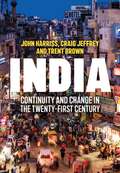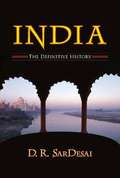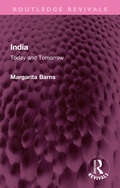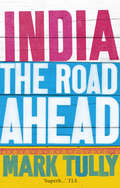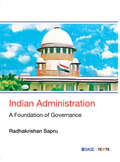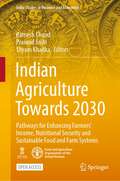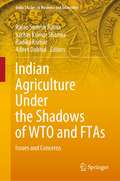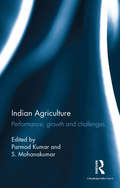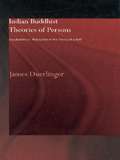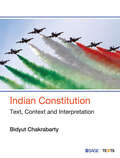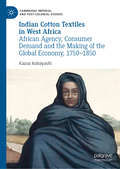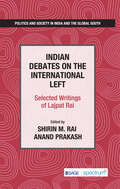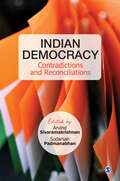- Table View
- List View
India-Pakistan in War and Peace
by J. N. DixitAs the Kashmir dispute brings India and Pakistan ominously close to nuclear war this book provides a compelling account of the history and politics of these two great South Asian rivals. Like the Israel-Palestine struggle, the Indian-Pakistan rivalry is a legacy of history. The two countries went to war within months of becoming independent and, over the following half-century, they have fought three other wars and clashed at the United Nations and every other global forum. It is a complex conflict, over religion and territory with two diametrically opposed views of nationhood and national imagination. J.N. Dixit, former Foreign Secretary of India, and one of the world's leading authorities on the region, has written a balanced and very readable account of the most tempestuous and potentially dangerous flashpoint in international politics.
India-Philippines Relations: Intersecting Interests, Shared Vision and Way Forward
by Reena MarwahThis book outlines 75 years of robust and multi-dimensional diplomatic relations between two democracies – India and the Philippines. Through nine chapters, penned by relying mainly on primary documents, published works, and consultations with experts and practitioners, this book takes the reader beyond historical, civilisational, political and economic synergies to locate the partnership and its potential in both bilateral and multilateral areas.This volume responds to questions such as: What explains the need to strengthen India-Philippines partnership undergirded by their historical, diasporic and cultural affinities? How have both New Delhi and Manila reassessed their economic and strategic visions in the context of the transforming Indo-Pacific discourses? Given that defence cooperation has been the hallmark of trust building, how has this been reflected in their shared visions for regional security, peace and prosperity? Finally, what are the key sectors and catalysts for forging closer cooperation for the next 25 years of India-Philippines diplomatic relations?Print edition not for sale in South Asia (India, Sri Lanka, Nepal, Bangladesh, Pakistan and Bhutan)
India-Russia Post Cold War Relations: A New Epoch of Cooperation
by Chandra RekhaPost Cold War international relations have undeniably been a litmus test for the bilateral relations between India and Russia. With the emergence of a new international system, the foreign policies of both countries vacillated to explore new avenues of partnerships with other international players, an opportunity that otherwise proved effective to a large extent. National priorities and the geo-political architecture remodelled by the US, thus, compelled New Delhi and Moscow to pursue a foreign policy that moved away from serving the interests of each other. While defining the trends in the bilateral relations between the two countries, the strategic community has questioned whether the relationship can remain as special and strategic as it had been in the past. Are both countries still as relevant to one another as they once were? <P><P>As the constant debate revolves around these questions, the two entities have, however, indicated a certain level of distinguishing characteristics in order to address the complexities and challenges in the partnership and have acknowledged that their relationship is not only special but also indispensable. What has also continued to remain undamaged and an integral part of the bilateral relations is mutual trust, understanding and concern, thus, resulting in maturity and pragmatism, irrespective of the uncertainties that the two countries face. It is in this context, that the new stage in the bilateral relations between the two countries requires a thorough assessment. It stands to reason that with the developments that are taking place in the current international milieu, there is a need for India and Russia to reemphasise their strong strategic partnership, goodwill and diplomatic trust that have stood the test of time. This book undertakes a serious assessment of the strategic partnership in the contemporary international set up. The seven chapters of the book attempt to address the myriad challenges through detailed analyses and evaluation of the partnership between India and Russia in various spheres, including the political, defence, economic, nuclear, energy, science and technology, security, and strategic engagement. <P><P>Please note: Taylor & Francis does not sell or distribute the Hardback in India, Pakistan, Nepal, Bhutan, Bangladesh and Sri Lanka
India-Thailand Cultural Interactions: Glimpses From The Past To Present
by Lipi GhoshThis volume looks at facets of cultural interactions between India and Thailand---two historically significant countries of the South East Asian region. For the first time a comprehensive discussion on historical and contemporary cultural interactions between Indian and Thailand has been attempted in this volume. Asianization has become an important contemporary concept and, in this context, understanding cultural exchange within Asia is an important exercise. The chapters in this volume include contributions from noted scholars based in India and Thailand on different areas of cultural exchange: from religion, to art, artefacts, clothing, music---especially Indian classical music, cuisine, and the contemporary use of shared civilizational tools in the cultural diplomacy of both countries. Written in a lucid and accessible language, the chapters in this insightful volume are of interest to academics and researchers of cultural studies, Asian studies, development studies, modern Asian history, policy makers and general readers.
India-US Relations in the Age of Uncertainty: An uneasy courtship (Rethinking Asia and International Relations)
by B.M. JainIn the initial phase of the Obama administration, India’s ruling class and strategic community formed a perception that the spirit of strategic partnership between the two countries might be diluted on account of China looming large in the priorities of this administration. Despite occasional hiccups in their relationship, this perception was overshadowed by the administration’s recognition of India’s role as counterweight to China in the Asia-Pacific region. This book addresses and re-evaluates the perceptions, policies and perspectives of public policy makers and bureaucratic elites in both India and the US in setting and articulating the tone, tenor and substance of the multi-faceted ties between the two countries. The scope of the book is not exclusively limited to the bilateral relationship in the critical areas such as the Indo-US nuclear deal, defence, security and strategic partnership. Its concerns and ramifications are much wider in global and regional contexts, covering/involving security architecture in the Asia-Pacific region, the interface between terrorism and weapons of mass destruction (WMDs), China as a factor in India-US relations, and the fallout of the New Delhi-Washington partnership on South Asia.
India-United States Cooperation on Global Security
by National Academy Of Sciences Committee on India-United States Cooperation on Global Security: Technical Aspects of Civilian Nuclear Materials Security Rita Guenther National Institute for Advanced Studies, Bangalore, India Nabeel Mancheri Micah Lowenthal Rajaram NagappaThe U.S. government has made safeguarding of weapons-grade plutonium and highly enriched uranium an international policy priority, and convened The 2010 Nuclear Security Summit in Washington, D.C., on April 12 and 13, 2010. Forty six governments sent delegations to the summit and twenty nine of them made national commitments to support nuclear security. During the Summit, India announced its commitment to establish a Global Centre for Nuclear Energy Partnership. The Centre is to be open to international participation through academic0 exchanges, training, and research and development efforts. India-United States Cooperation on Global Security is the summary of a workshop held by the U.S. National Academy of Sciences (NAS) together with its partner of more than 15 years, the National Institute for Advanced Studies (NIAS) in Bangalore, India. The workshop identified and examined potential areas for substantive scientific and technical cooperation between the two countries on issues related to nuclear material security. Technical experts from India and the United States focused on topics of nuclear material security and promising opportunities for India and the United States to learn from each other and cooperate. This report discusses nuclear materials management issues such as nuclear materials accounting, cyber security, physical security, and nuclear forensics.
India-United States Cooperation on Global Security: Summary Of A Workshop On Technical Aspects Of Civilian Nuclear Materials Security
by Rita GuentherIndia-United States Cooperation on Global Security
India-United States Cooperation on Science and Technology for Countering Terrorism: Summary of a Workshop
by Rita GuentherIndia and the United States are the world's two largest democracies with distinguished scientific traditions and experts in a wide range of scientific-technical fields. Given these strengths and the ability to learn from one another, the U. S. National Academy of Sciences together with the National Institute for Advanced Studies in Bangalore, India, held a joint Indian-U. S. workshop to identify and examine potential areas for substantive scientific and technical cooperation that can support counterterrorism efforts through the Homeland Security Dialogue and through direct cooperation. "India-United States Cooperation on Science and Technology for Countering Terrorism" is the summary of that workshop. This report examines topics such as biological threats; protection of nuclear facilities; security (physical and cyber) for chemicals, chemical facilities and other critical infrastructure; and monitoring, surveillance, and emergency response. The report also identifies and examines promising areas for further Indian-U. S. cooperation.
India: Continuity and Change in the Twenty-First Century (Politics Today Ser. #2)
by Craig Jeffrey John Harriss Trent BrownIndia has been catapulted to the centre of world attention. Its rapidly growing economy, new geo-political confidence, and global cultural influence have ensured that people across the world recognise India as one of the main sites of social dynamism in the early twenty-first century. In this book, research leaders John Harriss, Craig Jeffrey and Trent Brown explore in depth the economic, social, and political changes occurring in India today, and their implications for the people of India and the world. Each of the book’s fourteen chapters seeks to answer a key question: Is India’s democracy under threat? Can India’s Growth be sustained? How are youth changing India? Drawing on a wealth of scholarly and popular material as well as their own experience researching the country during this period of major transformation, the authors draw the reader into key debates about economic growth, poverty, environmental justice, the character of Indian democracy, rights and social movements, gender, caste, education, and foreign policy. India, they conclude, has undergone some extraordinary and positive changes since the early 1990s but deeply worrying threats remain: increasing authoritarianism, growing inequality, entrenched poverty, and environmental vulnerability. How India responds to these crucial challenges will shape the world’s largest democracy for years to come.
India: The Definitive History
by D. R. SardesaiD. R. SarDesai presents the history of India in its entire civilizational depth. <P><P>Using an Indiacentric approach, (as opposed to the Eurocentric or Anglocentric) the book covers the process of change in India through the centuries affecting different segments of the society, including the subalterns. He deals with the sweep of traditional Indian history as well as with the post-independence events, judicially balancing narrative and analysis in the conceptual framework of postcolonial and postmodernist approaches. This is the first major survey which deals with the entire Indian history along the lines of tradition and modernity instead of the old and largely inapplicable divisions of ancient, medieval and modern time frames. In adopting such a periodization, the book supports what is followed by most instructors in their courses on India.
India: Today and Tomorrow (Routledge Revivals)
by Margarita BarnsFirst published in 1937, India captures the tense and tumultuous developments in India that would eventually result in her freedom a decade later. The author, unaware of this future of freedom, still holds hope for India’s continued existence under the British Commonwealth even as she meticulously records India’s vacillating constitutional status over several Round Table Conferences. The Conferences reveal what the author considers India’s greatest problem: protracted strife within various religious and social communities. The casual racism and the superiority complex spread across the book is a reminder that the author thinks and talks like a coloniser, but if one can get past that, the book will prove to be an engaging read with its interesting anecdotes, astute observations, and a failed prediction. Students of postcolonial studies, history, ethnic studies, colonial history, and journalism will greatly benefit from reading this book.
India: the road ahead
by Mark TullySince the Indian economy was liberated from bureaucratic, socialist controls in 1991, it has developed rapidly. A country once renowned for the backwardness of its industries, its commerce and its financial market is now viewed as potentially one of the major world economies of the twenty-first century. But there are many questions which need to be asked about the sustainability of this rapid economic growth and its effect on the stability of the country. Have the changes had any impact on the poor and marginalised? Can India's democracy contain the mounting resentment of those left out of the new economic order? Can a high growth rate be sustained with India's notoriously corrupt and inefficient governance? Can the development of its creaking infrastructure be speeded up? How is India going to feed itself unless agriculture is reformed?This timely book will answer these questions through interviews with industrialists and cricketers, God men and farmers, plutocrats and former untouchables. Full of fascinating stories of real people at a time of great change, it will be of interest to economists, business people, diplomats, politicians, as well as to those who love to travel and who take an interest in the rapid growth of one of the world's largest countries, and what this means to us in the West.
Indian Administration - Postgraduate course M.A. Public administration - Second year - Paper VIII - PPA 203
by Institute Of Distance Education University Of Madras ChennaiThe book "Indian Administration" is a comprehensive study material designed for second-year postgraduate students of Public Administration under the University of Madras. It covers the evolution, framework, and key structures of Indian administration, from ancient to contemporary times. Topics include the constitutional setup, federalism, central and state administrative frameworks, parliamentary democracy, and local governance. It addresses critical issues like minister-secretary relationships, corruption, and the impact of globalization and information technology on governance. With detailed analyses of historical periods and administrative reforms, it aims to equip learners with a nuanced understanding of India's administrative systems and challenges. Designed in a self-learning format, it is supported by model questions and key summaries to aid distance education students.
Indian Administration: A Foundation of Governance
by Radhakrishan SapruIndian Administration: A Foundation of Governance offers a modern introduction to the structure and functioning of Indian public administration. The text has been developed keeping in mind the various conceptual shifts in the idea and practice of governance and its effects at both domestic and global levels. It analyses the fundamentals of Indian administration and its multiple aspects through the lens of public administration theories and practices. Beginning with the evolutionary stages of administrative functions in independent India, the book elaborately traces the role of the Constitution in creating the framework for good governance. It provides critical insights into the development of local governance in India, the crucial relationship between the elected representatives and civil servants, the role of ethics in governance and the much debated aspects of social welfare administration. This comprehensive textbook will be an indispensable companion to the students of public administration, political science, and UGC NET and civil services aspirants. Key Features • Analytical approach in examining the fundamental themes and key issues in Indian administration. • Theoretical and practical aspects of administration and governance explained in an easy-to-understand manner • Special focus on social welfare administration, administrative reforms and local governance
Indian Agriculture Towards 2030: Pathways for Enhancing Farmers’ Income, Nutritional Security and Sustainable Food and Farm Systems (India Studies in Business and Economics)
by Ramesh Chand Pramod Joshi Shyam KhadkaThis open access book brings together varying perspectives for transformational change needed in India’s agriculture and allied sectors. Stressing the need of thinking for a post-Green Revolution future, the book promotes approaching this change through eight broad areas, indicating the policy shifts needed to meet the challenges for the coming decade (2021-2030).The book comprises of ten contributions. Apart from the overview chapter on transformational change and the concluding chapter on pathways for 2030, there are eight thematic chapters on topics such as transforming Indian agriculture, dietary diversity for nutritive and safe food; climate crisis and risk management; water in agriculture; pests, pandemics, preparedness and biosecurity natural farming; agroecology and biodiverse futures; science, technology and innovation in agriculture; and structural reforms and governance. The writing style of these papers written by technical experts is forward-looking—not merely an analysis of what has been and why it was so, but what ought to be.This is an essential reading for those interested in agriculture, food and nutrition sectors of India, and more so their interconnectedness.
Indian Agriculture Under the Shadows of WTO and FTAs: Issues and Concerns (India Studies in Business and Economics)
by Rajan Sudesh Ratna Sachin Kumar Sharma Radika Kumar Adeet DobhalThis book examines the various issues and concerns faced by Indian agriculture under the obligations of WTO and the Free Trade Agreements. While the issues discussed pertain mainly to India, the lessons can also be derived for many other similarly placed developing countries. The book delves into various aspects of Indian agricultural trade and evaluates the domestic policies and regulations of government while also looking at external factors like WTO, free trade agreements and non-tariff barriers. Chapters of this book have been contributed by eminent agricultural economists, lawyers and social scientists providing the perspective from their sector. This book highlights the challenges and opportunities for agriculture sector under the rapidly growing regional trade agreements and results of negotiations under the WTO. It also provides critical insights into the ongoing fisheries subsidies negotiations at the WTO and issues relating to non-tariff measures. The findings have broad implications for developing countries in general and India in particular. This book will greatly benefit trade negotiators, policymakers, civil society, farmer groups, researchers, students, and academics interested in issues related to the WTO, FTAs, tariff and non-tariff barriers and other allied issues concerning Indian agriculture. The techniques used in analytical part will mostly benefit the researchers as they can not only use these techniques and methodologies for their future research, but to also carry the research forward. The book is useful for many educational institutes which teach international trade, agricultural economics, and WTO and FTAs studies.
Indian Agriculture: Performance, growth and challenges. Essays in honour of Ramesh Kumar Sharma
by Parmod Kumar S. MohanakumarThis volume examines the transitions in Indian agriculture since the 1980s, and emphasizes upon the role of neoliberal policies and their impact. The essays presented here deal with a range of pertinent and contemporary issues, including global food security, livelihoods of agricultural labourers, and public and private investment. These weave together glimpses of the impasse faced by petty commodity producers (marginal and small farmers) and their subsequent economic distress and social exclusion. Comprehensive in analysis, this book will be useful to scholars and researchers of agricultural economics, political economy, political science and public policy.
Indian Buddhist Theories of Persons: Vasubandhu's Refutation of the Theory of a Self (Routledge Critical Studies in Buddhism)
by James DuerlingerIn this book, Vasubandhu's classic work Refutation of the Theory of a Self is translated and provided with an introduction and commentary. The translation, the first into a modern Western language from the Sanskrit text, is intended for use by those who wish to begin a careful philosophical study of Indian Buddhist theories of persons. Special features of the introduction and commentary are their extensive explanations of the arguments for the theories of persons of Vasubandhu and the Pudgalavâdines, the Buddhist philosophers whose theory is the central target of Vasubandhu's refutation of the theory of a self.
Indian Constitution At Work class 11 - NCERT - 23 (Political Science)
by National Council of Educational Research and TrainingThe "INDIAN CONSTITUTION AT WORK" textbook in Political Science for Class XI by NCERT provides a comprehensive overview of the functioning of the Indian Constitution. It delves into the historical background, the making of the Constitution, and its philosophy. The book expounds on the salient features, including the Preamble, the Fundamental Rights, and the Directive Principles of State Policy. It demystifies the federal structure, the roles of the Executive, Judiciary, and Legislature, and the relationship between the Centre and the States. The textbook also touches upon the challenges the Constitution has faced, the amendments made, and the importance of institutions like the Election Commission and the Panchayati Raj. Through lucid explanations, illustrations, and real-life examples, it offers readers an insight into the dynamic nature of the Constitution and its significance in ensuring democracy, justice, and equality in India.
Indian Constitution First Semester FYBA New NEP Syllabus - SPPU
by Dr Pramod R. TambeThe book “Indian Constitution (Political Science)”, is a comprehensive exploration of the Indian Constitution as per the NEP syllabus for F.Y.B.A. (Semester I). It details the making of the Constitution, its historical evolution, and the functioning of the Constituent Assembly. The text includes discussions on fundamental aspects such as Fundamental Rights, Duties, and Directive Principles of State Policy, while also elaborating on the Preamble and salient features like democracy, secularism, and federalism. Additionally, it explains constitutional principles, amendments, and unique features like the parliamentary system and judicial independence, offering students an analytical understanding of India's constitutional framework.
Indian Constitution: Text, Context and Interpretation
by Bidyut ChakrabartyIt is important that we recognize the Indian Constitution not only as a legal or moral entity but also as a living organism, sustaining and consolidating our constitutional democracy. Indian Constitution: Text, Context and Interpretation presents an understanding of the Constitution in the context of the rapid changes arising out of indigenous and exogenous influences. It traces the evolution of the constitutional provisions, their core nature and manifestation with reference to the situational socio-economic circumstances in a globalizing world. This book stands apart from the other existing titles on the subject as it goes beyond the conventional mode of understanding the Constitution. It is both informative and intriguing as it deals with the actual constitutional provisions, and critically analyses the foundational values on which they rest. Key Features An analytical account of the processes leading to the making of the Constitution A thorough discussion of the core constitutional provisions Reinterpretation of the constitutional provisions in the light of multiple judicial pronouncements
Indian Cotton Textiles in West Africa: African Agency, Consumer Demand and the Making of the Global Economy, 1750–1850 (Cambridge Imperial and Post-Colonial Studies Series)
by Kazuo KobayashiThis book focuses on the significant role of West African consumers in the development of the global economy. It explores their demand for Indian cotton textiles and how their consumption shaped patterns of global trade, influencing economies and businesses from Western Europe to South Asia. In turn, the book examines how cotton textile production in southern India responded to this demand. Through this perspective of a south-south economic history, the study foregrounds African agency and considers the lasting impact on production and exports in South Asia. It also considers how European commercial and imperial expansion provided a complex web of networks, linking West African consumers and Indian weavers. Crucially, it demonstrates the emergence of the modern global economy.
Indian Debates on the International Left: Selected Writings of Lajpat Rai
by Shirin M. Rai Anand PrakashThis book traces the Indian Left's engagement with the international communist debates of the 1960s and 1970s, shedding new light on the fault lines within the Left as well as on its international solidarities. Lajpat Rai argued for rethinking established leftist positions, seeking inspiration in experiment and developing creative approaches for the sustainability of socialist ideas and ideals. The contemporary relevance of these debates is significant as the Left remains without a sharp response to the rise of neoliberalism and right-wing populism in India, and a failure of the Left to recognize the challenges emanating from a strongly integrated and organized finance capital on the one hand and the increasingly self-aware identity politics on the other. Democratic opposition rather than a bureaucratic thinking needs to be the backbone of any meaningful Left struggle. Lajpat Rai's passionate writing gives expression to the spirit and intensity of political debates at the time and the role of the Left intelligentsia in comprehending, from a committed socialist angle, the shifting paradigms of an unstable world to help bring about progressive change.
Indian Democracy: Contradictions and Reconciliations
by Arvind Sivaramakrishnan and Sudarsan PadmanabhanIndian Democracy: Contradictions and Reconciliations provides a vivid presentation of major facets of democracy in India. It aims to explore how Indian democracy has functioned, with reference to its theoretical foundations, institutional mechanisms and procedures, and political practices. The book starts with a close analysis of the Constitution of India, which provides the theoretical validation for democratic politics and serves as a reflective and regulative ideal. It highlights the way adherence to democratic principles and nurturing of strong institutions have helped India negotiate and often reconcile contradictions such as caste inequalities, linguistic and ethnic identities, majority–minority divide, gender bias and divergences in the conception of democracy itself. Furthermore, the book delineates significant improvements in the maintenance of accurate electoral registers, enforcement of the Model Code of Conduct and use of electronic voting machines, considerable reductions in violence and intimidation in the recent decades, which have together contributed to strengthening the Indian voter’s confidence in democratic processes. This edited book will prove indispensable for all those who are interested in a close understanding of democracy in India.
Indian Economy - 2nd Edition - Competitive Exam: A complete guide on the concepts of Indian Economy for UPSC, CSE and State PCS Examinations
by Study IQ Education Pvt. Ltd.The second edition of Indian Economy by Study IQ Publications is a comprehensive guide designed to address the Indian Economy syllabus for UPSC Civil Services and State PCS examinations. Structured to cover both prelims and mains, particularly GS Paper III (Economic Development), the book provides in-depth insights into key economic concepts, policies, and trends. Topics include macroeconomic indicators, agricultural and industrial development, fiscal and monetary policies, and financial markets. Additionally, it emphasizes inclusive growth, sustainable development, and the interplay between different sectors like agriculture, industry, and services. Supported by updated data, budgetary insights, infographics, and previous years' questions, this resource aids aspirants in conceptual clarity and application. The inclusion of economic surveys and policy updates ensures that candidates are well-prepared for competitive exams.

